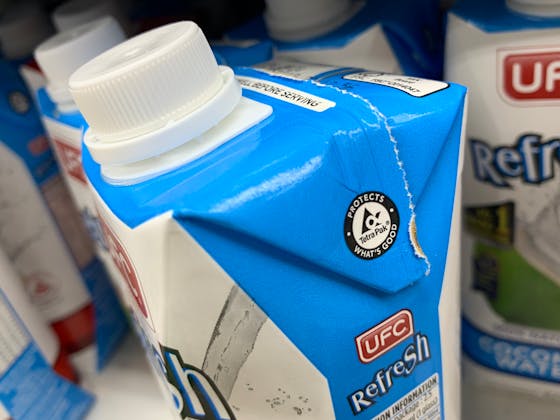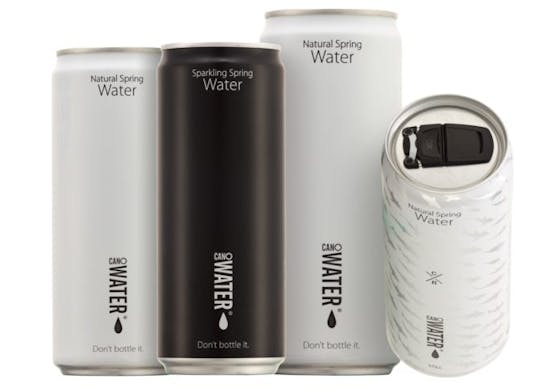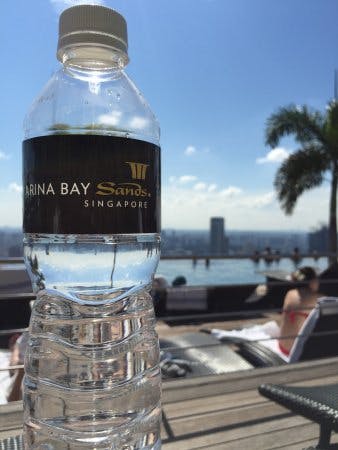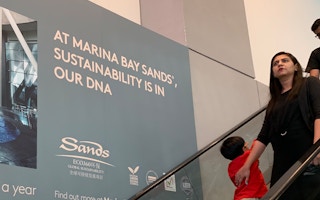Singapore’s largest hospitality group, Marina Bay Sands (MBS), has opted to stick with plastic bottles to serve its customers water after a procurement tender to find an alternative packaging solution.
To continue reading, subscribe to Eco‑Business.
There's something for everyone. We offer a range of subscription plans.
- Access our stories and receive our Insights Weekly newsletter with the free EB Member plan.
- Unlock unlimited access to our content and archive with EB Circle.
- Publish your content with EB Premium.
This will mean that the hotel, events and casino brand, owned by multi-billion dollar gaming giant Las Vegas Sands, will consume an additional 14 million single-use polyethylene terephthalate (PET) plastic bottles across its business by 2021, according to a source familiar with the tender.
MBS’ decision comes at a time when some businesses in the hospitality sector are moving away from single-use plastic because of a surge in awareness of its environmental impact.
But use of the material remains highly prevalent in Singapore and many countries across the world, with virtually every hotel group still providing plastic bottles to their customers.
Hailin Pek, manager of Zero Waste SG, a civic society group that works with companies to reduce their plastic dependence, told Eco-Business that serving water in plastic bottles is perceived by hotel brands to be a “gold standard” in service provision, and is “expected” by their clientele. Branded bottles are also used as a form of advertising.
Sustainability or price?
Marina Bay Sands chose PET over paper-based container option Tetra Pak and aluminium brand CanO Water, according to a document shared with Eco-Business.
Commenting on the decision, MBS said that it is important for the company, and hospitality sector, to “avoid short-term reactions” to sustainability challenges, such as replacing one type of packaging material with another, without looking in detail at the long-term environmental impact of the alternatives to plastic.
MBS said that PET was chosen partly as a result of recent life-cycle analysis into potential plastic replacements. The study found that a 500-millilitre plastic bottle has a significantly lower carbon footprint than alternatives in the Singapore context.
Plastic is also much cheaper than the alternatives. A single PET bottle costs about 25 cents, half the price of a Tetra Pak carton and is also cheaper than a CanO Water can.
Plastic, aluminium or paper?

A Tetra Pak container, which is made of paperboard, plastic and aluminium. Image: Eco-Business
Thomas Peacock-Nazil, founder and chief executive of Seven Clean Seas, a social enterprise that works with companies to reduce their disposables footprint, said that, the best solution for the environment was to use no disposable containers at all.
As an alternative, “MBS should be able to produce mineralised water onsite and package it in branded, lightweight, reusable glass or bamboo bottles,” he said, adding that MBS could introduce a charge for bottles that are not returned to minimise losses.
Many of MBS’ competitors such as Sino Hotels Group, the owner of the iconic Fullerton Hotel, have installed drinking fountains and water stations to replace the need for plastic bottled water. MBS also already provides such refill stations at conferences and events, and provides reuseable cups for this purpose.
Peacock-Nazil said that, of the disposal options, the aluminium-based CanO Water was likely the most sustainable choice—depending on the local context.
Aluminium, though resource intensive to produce, is the most recyclable packaging material available—75 per cent of aluminium ever produced has been recycled, compared to 9 per cent of all plastic. It can be disposed of, recycled, and be back on sale within 60 days, if the infrastructure is available, Peacock-Nazil said.
“
Although better that Tetra Pak, it [PET] is not a truly sustainable option.
Thomas Peacock, founder and chief executive, Seven Clean Seas
As Singapore does not have many recycling plants, used aluminium cans would be shipped overseas for recycling. Aluminium weighs marginally more than PET, and so would result in higher emissions during shipping, but it is truly recyclable as it never loses its strong, lightweight, corrosion-resistant properties, and is the one of most cost-effective materials to recycle.

CanO Water is a resealable aluminium can from the UK launched as a greener alternative to single-use plastic bottles. Image: CanO Water
“Aluminium is the closest packaging material we have for achieving the closed loop circular economy. Some cans are lined with small amounts of plastic though and this should be a consideration, Peacock-Nazil noted.
The worst option of the three is Tetra Pak, as it is made up of different types of layered material that are notoriously difficult to recycle, and is recycled for much lower quality purposes such as construction, or not truly recycled at all, Peacock-Nazil commented.
PET, in the Singapore context, is “complicated”, he said.
Though light and easier to recycle than Tetra Pak cartons, the sustainability of PET bottles depends on their fate after use.
“Will they be collected and sent for recycling independently by MBS to guarantee high recycling rates? Or will they enter the government recycling system, which is blighted by contamination and low recycling rates?” he said.
Some 40 per cent of recyclables in Singapore cannot be recycled because they are contaminated by food or liquid, so are incinerated.
Peacock-Nazil noted that many plastic bottles would likely end up in general waste bins, rather than disposed of properly in the 2,650 recycling bins on MBS’ premises.

A Marina Bay Sands-branded plastic bottle of water on a table at the hotel’s iconic SkyPark. Image: Tripadvisor.co.nz
“Everything that is not recycled in Singapore will be incinerated, which will lead to further emissions and the incineration ash will further accelerate the fillup of our landfills, he said. Singapore’s only landfill, Semakau island, is projected to be completely full by 2035 or earlier.
“Although better that Tetra Pak, it [PET] is not a truly sustainable option,” he said.
According to calculations by an expert for Eco-Business, a 200-room four-star hotel can use about 300,000 pieces of single-use plastic in a month if it is at full-capacity.
In response to changing consumer sentiments, many hotel groups have recently started to commit to phasing out single-use plastic.
Mandarin Oriental has committed to stop using single-use plastic by 2021, Marriott plans to quit single-use plastic toiletries by 2020, and Millennium Hotels and Resorts said it would phase out single-use plastic this June.
Six Singapore hospitality firms have signed up to PACT, a campaign by World Wide Fund for Nature to persuade businesses to ditch disposables.
MBS is on the same path. The company said that it has already replaced polypropylene straws with paper or bioplastic straws in its food and beverage outlets, installed water dispensers at its events facilities, and replaced single-use plastic laundry bags with paper and reusable trays to deliver laundry.
“Marina Bay Sands has always prioritised reduction of environmental impact in its operations, and this commitment has never wavered,” the company told Eco-Business.
Pek added: “There is a huge potential for hotels in Singapore to relook product design and the type of service provision which maintains standards without compromising on quality, for instance, providing more experiences over “free” products with excess packaging. On the other hand, as consumers, there is a need to appreciate and utilise resources more prudently.”








